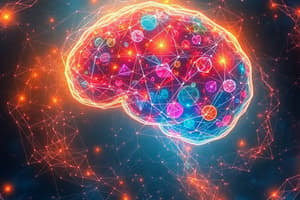Podcast
Questions and Answers
A child is consistently praised for tidying their room. Over time, they become less motivated to tidy up simply for praise, but continue to do so because they now find the organized space more pleasant. Which concept best explains this shift in motivation?
A child is consistently praised for tidying their room. Over time, they become less motivated to tidy up simply for praise, but continue to do so because they now find the organized space more pleasant. Which concept best explains this shift in motivation?
- Operant conditioning resulting in a cognitive map.
- Positive reinforcement being replaced by intrinsic reward. (correct)
- Continuous reinforcement transitioning to observational learning.
- Negative reinforcement leading to habituation.
A researcher aims to train a rat to press a lever in a Skinner box. Which of the following approaches would likely be MOST effective according to the principles of operant conditioning?
A researcher aims to train a rat to press a lever in a Skinner box. Which of the following approaches would likely be MOST effective according to the principles of operant conditioning?
- Using shaping by rewarding successive approximations of lever-pressing behavior. (correct)
- Punishing the rat with a mild electric shock every time it moves away from the lever.
- Waiting for the rat to accidentally press the lever and then immediately delivering food.
- Consistently pairing a flashing light with the presentation of food, regardless of the rat's behavior.
A therapist is helping a client overcome a phobia of dogs. They start by having the client look at pictures of dogs, then watch videos of dogs, and eventually interact with a friendly dog in a controlled environment. Which learning principle is the therapist employing?
A therapist is helping a client overcome a phobia of dogs. They start by having the client look at pictures of dogs, then watch videos of dogs, and eventually interact with a friendly dog in a controlled environment. Which learning principle is the therapist employing?
- Modeling to induce habituation.
- Observational learning through vicarious reinforcement.
- Classical conditioning through systematic desensitization. (correct)
- Operant conditioning using negative reinforcement.
In the Bobo doll experiment, children who watched an adult act aggressively towards the Bobo doll were more likely to imitate that behavior. Which concept does this experiment primarily illustrate?
In the Bobo doll experiment, children who watched an adult act aggressively towards the Bobo doll were more likely to imitate that behavior. Which concept does this experiment primarily illustrate?
A person who initially finds the sound of city traffic highly disruptive eventually becomes less aware of it over time. Which of the following learning processes best accounts for this?
A person who initially finds the sound of city traffic highly disruptive eventually becomes less aware of it over time. Which of the following learning processes best accounts for this?
A student studies for a psychology exam and then immediately studies for a sociology exam. On the psychology exam, they struggle to remember key psychology concepts, often mixing them up with sociology terms. Which type of interference is most likely the cause of their difficulty?
A student studies for a psychology exam and then immediately studies for a sociology exam. On the psychology exam, they struggle to remember key psychology concepts, often mixing them up with sociology terms. Which type of interference is most likely the cause of their difficulty?
A person involved in a car accident can remember everything that happened after the accident but cannot recall any details from the week leading up to it. Which type of amnesia are they most likely experiencing?
A person involved in a car accident can remember everything that happened after the accident but cannot recall any details from the week leading up to it. Which type of amnesia are they most likely experiencing?
A comedian prepares for a show by mentally grouping jokes into categories like 'Observational Humor,' 'Political Satire,' and 'Self-Deprecating Stories.' Which memory-enhancing strategy are they employing?
A comedian prepares for a show by mentally grouping jokes into categories like 'Observational Humor,' 'Political Satire,' and 'Self-Deprecating Stories.' Which memory-enhancing strategy are they employing?
During a memory test, participants are presented with a list of words. They tend to remember the first few words and the last few words better than the words in the middle of the list. This phenomenon is known as:
During a memory test, participants are presented with a list of words. They tend to remember the first few words and the last few words better than the words in the middle of the list. This phenomenon is known as:
A person watches a news report about a bank robbery where the robber wore a clown mask. Later, when asked to recall details, they vividly remember the clown mask but incorrectly recall the robber using a water pistol instead of a real gun because of a joke they heard afterwards. This memory distortion is an example of:
A person watches a news report about a bank robbery where the robber wore a clown mask. Later, when asked to recall details, they vividly remember the clown mask but incorrectly recall the robber using a water pistol instead of a real gun because of a joke they heard afterwards. This memory distortion is an example of:
An investor continues to pour money into a failing business venture, justifying it by saying, 'I've already invested so much, I can't quit now!' This is an example of which cognitive bias?
An investor continues to pour money into a failing business venture, justifying it by saying, 'I've already invested so much, I can't quit now!' This is an example of which cognitive bias?
According to the Yerkes-Dodson Law, what is the relationship between arousal and performance?
According to the Yerkes-Dodson Law, what is the relationship between arousal and performance?
According to Selye's General Adaptation Syndrome (GAS), what is the body's initial response to a stressor called?
According to Selye's General Adaptation Syndrome (GAS), what is the body's initial response to a stressor called?
Flashcards
Mnemonic Device
Mnemonic Device
Memory aids using imagery and organization.
Chunking
Chunking
Organizing information into manageable units.
Serial Position Effect
Serial Position Effect
Better recall of first and last items in a list.
Proactive Interference
Proactive Interference
Signup and view all the flashcards
Retroactive Interference
Retroactive Interference
Signup and view all the flashcards
James-Lange Theory
James-Lange Theory
Signup and view all the flashcards
Cannon-Bard Theory
Cannon-Bard Theory
Signup and view all the flashcards
Gambler’s Fallacy
Gambler’s Fallacy
Signup and view all the flashcards
Shaping
Shaping
Signup and view all the flashcards
Partial/Intermittent Reinforcement
Partial/Intermittent Reinforcement
Signup and view all the flashcards
Operant Conditioning
Operant Conditioning
Signup and view all the flashcards
Positive Reinforcement
Positive Reinforcement
Signup and view all the flashcards
Negative Reinforcement
Negative Reinforcement
Signup and view all the flashcards
Study Notes
Memory & Cognition
- Mnemonic Device: Memory aids that use vivid imagery and organizational techniques.
- Chunking: Aids memory by organizing information into manageable units.
- Serial Position Effect: Recall is best for the first and last items on a list.
- Primacy effect: Enhanced recall of the initial items on a list.
- Recency effect: Enhanced recall of the most recent items on a list.
- Proactive Interference: Old information disrupts the recall of new information.
- Retroactive Interference: New information disrupts the recall of old information.
- Retrograde Amnesia: Inability to retrieve past memories.
- Anterograde Amnesia: Inability to form new memories.
- Working/Short-Term Memory: Memory system with limited capacity for processing and temporarily holding information.
- Long-Term Memory: Memory system with a relatively permanent and limitless storage capacity.
- Encoding, Storage, Retrieval: The three processes of memory are getting information in, retaining it, and getting it back out.
- Recall: Retrieving previously learned information without cues.
- Recognition: Identifying previously learned information with cues.
Cognitive Biases & Errors
- Gambler’s Fallacy: Mistakenly believing past random events impact future probabilities.
- Sunk-Cost Fallacy: Continuing an endeavor due to past investments, even when it’s no longer beneficial.
- Misinformation Effect: Memory distortion from misleading information.
Theories of Emotion
- James-Lange Theory: Emotion follows a physiological response; feeling afraid because we tremble.
- Cannon-Bard Theory: Emotional and physiological responses occur simultaneously.
- Schachter-Singer (Two-Factor) Theory: Emotion arises from physiological arousal and cognitive interpretation.
- Yerkes-Dodson Law: Performance increases with arousal to a point, then declines.
Stress & Adaptation
- General Adaptation Syndrome (GAS): Selye’s stress response model with alarm, resistance, and exhaustion stages.
Learning & Conditioning
- Shaping: Reinforcing behaviors that gradually approximate a desired behavior.
- Partial/Intermittent Reinforcement: Reinforcing a response only some of the time for greater resistance to extinction.
- Continuous Reinforcement: Reinforcing a behavior every time it occurs, which leads to rapid learning but quick extinction.
- Positive Reinforcement: Increases behavior by adding a stimulus.
- Negative Reinforcement: Increases behavior by removing an unpleasant stimulus.
- Operant Conditioning: Learning where behavior is strengthened by reinforcement or weakened by punishment.
Key Experiments & Psychologists
- Little Albert Experiment: Watson's experiment conditioned fear of a white rat in a baby.
- B.F. Skinner: A behaviorist known for operant conditioning and the Skinner box.
- Classical Conditioning: Learning through the association of two stimuli.
- Ivan Pavlov: Discovered classical conditioning when dogs salivated to a bell.
- Bobo Doll Experiment: Bandura's study showed children imitate aggressive behavior.
- Observational Learning: Learning by watching others.
- Modeling: Imitating a specific behavior.
- Habituation: Decreasing responsiveness to repeated stimuli.
- Cognitive Map: A mental representation of spatial layout.
Studying That Suits You
Use AI to generate personalized quizzes and flashcards to suit your learning preferences.




